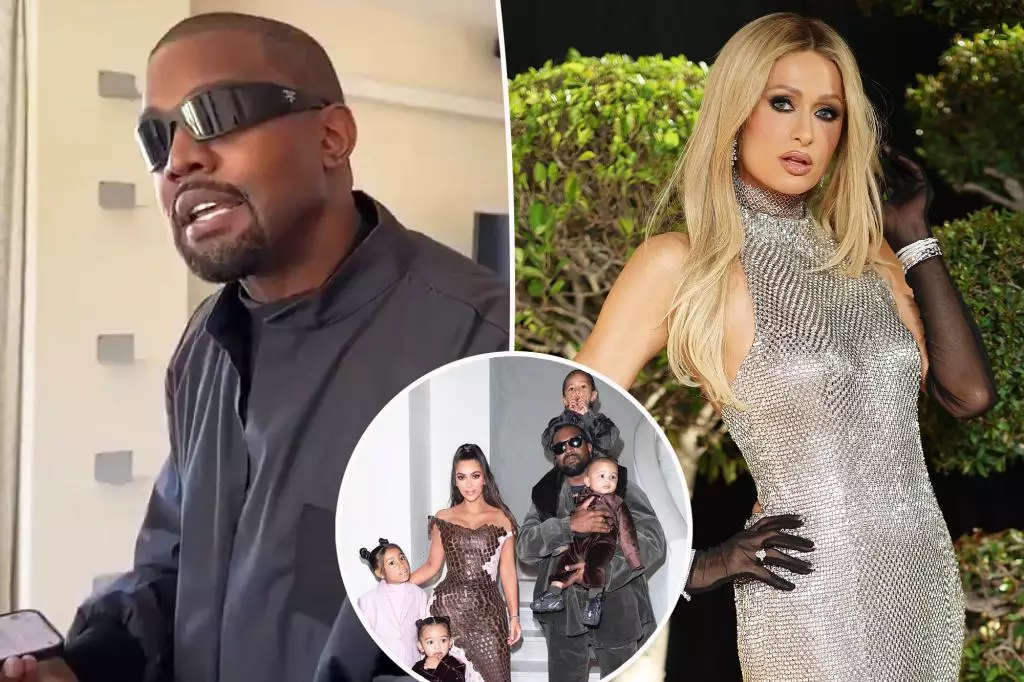In a world where celebrity relationships are often analyzed and scrutinized, few statements elicit as much astonishment as Kanye West’s latest reflection on his past. The rapper, now known as Ye, stirred considerable waves during a Twitch livestream—an event that was abruptly cut short. His candid commentary included an eyebrow-raising suggestion that he “should’ve had babies with Paris Hilton instead of his ex-wife, Kim Kardashian.” This sentiment, surprising in its bluntness, not only sheds light on Ye’s ongoing struggles with his personal life but also illustrates the difficulties of navigating a world dominated by fame and public perception.
Ye’s assertion doesn’t just question his relationship choices; it digs into the deep-rooted complexities of romantic partnerships in the age of social media. Public figures like Kanye are continually under the microscope, and their statements can have far-reaching consequences, both personally and professionally. The notion that he wistfully fantasizes about a life with Hilton—famed for her entrepreneurial spirit and familial legacy—leaves much to unpack about the interplay of celebrity and desire.
A Rhetorical Analysis of Ye’s Claims
Ye’s comments, which initially may sound like typical “what if?” musings, actually hold deeper implications. By projecting a scenario in which he could have fathered children with Hilton, he appears to suggest that such a union would have yielded inherent advantages, such as entrepreneurial endeavors linked to the Hilton brand. It’s a profound statement wrapped in humor but tinged with underlying frustration about his current familial dynamics with Kardashian.
The irony of his claim doesn’t escape scrutiny either. The significance of Kim Kardashian, once referred to as Hilton’s assistant, reflects an entire narrative of ascension from obscurity to prominence. In a way, there’s a hint of a power struggle woven into his words; a suggestion that when pairing up with Kardashian, he chose to align with someone with who he believed he had shared aspirations, only to later voice his regrets in a public forum.
This public lament echoes not just through his marriage, which ended in divorce, but also highlights his evolving identity as a father. Through his statements, one can perceive his sense of loss—both in the dissolution of the marriage and in constituting an enduring father-to-child connection amid chaotic circumstances.
The Role of Public Perception and Media Influence
The chaotic nature of his outburst also invites questions about media influence on celebrity narratives. His subsequent ban from Twitch following the livestream raises significant questions about the boundaries of free speech among public figures. One could argue that the cancel culture surrounding celebrities and the ephemeral nature of social media interaction curtail authentic dialogue—many stars resort to sensational expressions as a means of navigating their fractured realities.
Ye’s remarks about international icons like Arnold Schwarzenegger and their familial complications further demonstrate his desire to align his narrative within a broader cultural context. However, such references also illustrate the absurdity of comparing his life to that of others without acknowledging the uniquely challenging position he occupies within both the entertainment industry and the public’s collective consciousness.
The Dynamics of Fame and Personal Relationships
Moreover, the reaction from Kardashian’s camp asserts a crucial counterpoint: Ye has access to his children whenever he wishes. The dynamics of co-parenting amid the pressures of fame often lead to misunderstandings and disputes, yet they can simultaneously reveal the fractured complexities of a partnership once interwoven with shared success. The insistent need for Kardashian to prioritize her children’s safety in these interactions speaks to the protective instincts of a mother navigating a relationship strained by tumult.
Ye’s public quest for reconciliation with his children, juxtaposed against Kardashian’s seemingly calculated response, illustrates the broader societal discourse on parenting and celebrity culture. His candid expressions on platforms like Twitter amplify the tension inherent in parental rights disputes, further complicating the relationship between celebrity, media portrayal, and child welfare.
Through this lens, it becomes evident that while Kanye West’s comments appear trivial on the surface, they actually encapsulate a microcosm of larger societal issues surrounding celebrity, familial bonds, and the repercussions of fame—a narrative layered with conflicting emotions, desires, and disappointments.

